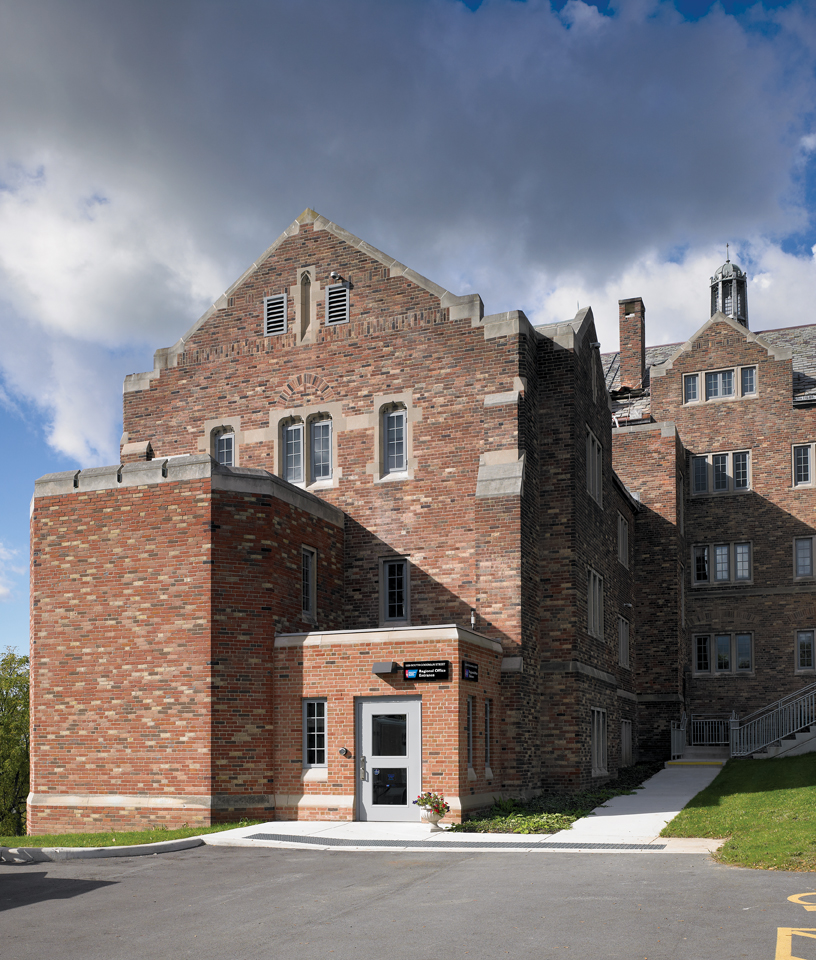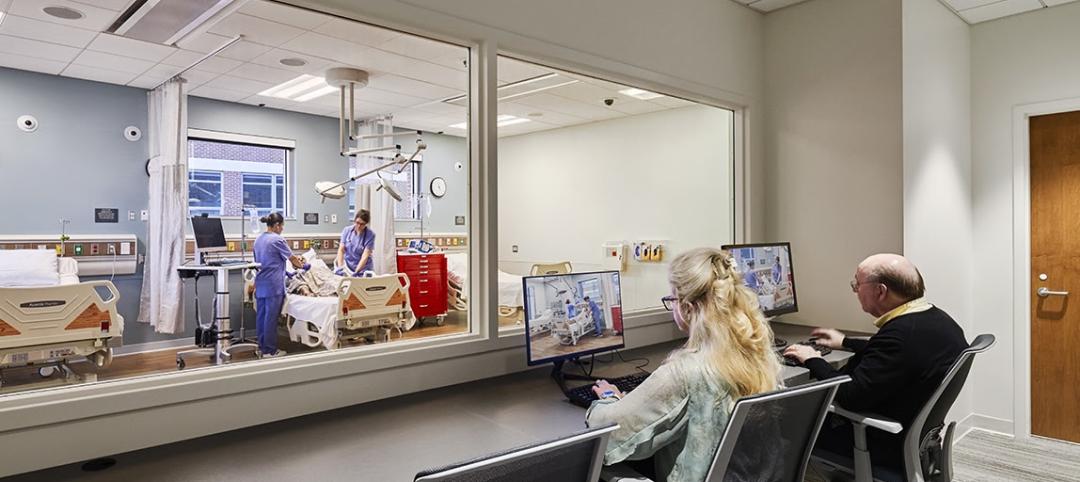The B. Thomas Golisano Hope Lodge Hospitality House, located on the edge of the Colgate Rochester Crozier Divinity School (CRCDS) campus in Rochester, N.Y., was destined to change the lives of many who have called the building home.
Constructed in the 1930s, the structure hosted CRCDS’s theological studies while serving as a seminary dormitory. Composed and rendered in the collegiate gothic style by architect James Gamble Rogers, the “Castle on the Hill” echoed similar structures found on the campuses of Yale, Columbia, and Northwestern.
Over time, the number of students requiring dormitories dwindled, and CRCDS found itself with more space than it needed.
Eventually, school officials decided to operate within a smaller footprint. However, CRCDS was still tasked with maintaining all campus buildings, including the now-vacant structure. As expenses related to the building mounted, school officials considered demolishing it.
With the future of the structure in doubt, the nearby American Cancer Society’s Rochester Hope Lodge was quickly outgrowing its facility of 25 years. It did not take long before CRCDS and American Cancer Society realized the benefits of a partnership.
Click here to view profiles of other reconstruction projects that have been recognized as part of BD+C's 28th Annual Reconstruction Awards.
As the partnership between CRCDS and American Cancer Society evolved, the CRCDS’s vacant theological studies center and seminary dormitory were selected as the home for the new Hope Lodge. Design concepts were quickly formulated, and a budget established thanks to $8 million in fundraising efforts, led by philanthropist B. Thomas Golisano.
The early stages of the reconstruction project progressed smoothly until a hazardous materials survey conducted on the facility revealed the presence of asbestos in the finishes and roofing materials. But it was also infused in the plaster covering the walls and ceilings throughout the buildings.
GIVING THE BUILDING ENVELOPE THE ONCE-OVER
In addition to the asbestos removal, the existing floor layout would have to be gutted as the narrow double-loaded corridor did not meet current egress requirements. The single-occupant rooms were cramped and much too small for the needs of Hope Lodge. Finally, the historic masonry exterior and the slate roof of the building had suffered decades of deferred maintenance and were in need of repair.
“We were, in many ways, creating a new building envelope. The restoration of the historic exterior required close coordination with the new interior perimeter,” says Jim Durfee, AIA, principal architect, Bergmann Associates.
The Building Team, consisting of local firms Bergmann Associates (architect), Torchia Structural Engineering (structural engineer), and LeChase Construction (construction manager), faced other design issues on the Hope Lodge project as well.
PRODUCT LIST
B. Thomas Golisano Hope Lodge, Hospitality House, Rochester, N.Y.Masonry Cleaner: Sure Klean
Roofing: Carlisle Epdm
Windows: Oldcastle Ogep Series 2000
Gypsum Board: USG
Window Treatments: Drapery Industries
Interior Signage & Donor Wall: Id Sign Systems
Artwork: Great American Art (Brontman’s Corporate Dimensions)
Furniture: Om Workspace (Carolina & Grand Rapids)
Lamps: Crown Electric
Interior Architectural Woodwork: Solid Surface, Zodiak
Solid Surface: Corian
Plastic Laminate: Formica
Plastic Laminate: Wilsonart
Acoustical Ceiling: Acoustical Ceiling Tile, Armstrong World Industries, Inc.
Tile Carpeting: Modular Tile Carpet, 24" X 24" Shaw Contract Group Collection, Dressed To Kill
Modular Tile Carpet: 18" X 18" Bentley Prince Street Collection, Saturnia
Modular Carpet Tile: 24"X24" Patcraft & Design Weave Collection, Construkt Series
Walk-Off Mat: 12"X12" Roppe Surface Walk-Off Mat Collection, 'Rop-Cord' Rubber (Tire Tread) Tiles
Interior Paint: Sherwin Williams, Pro-Green Interior Latex
Toilet Compartments: Hadrian
Plumbing Fixtures: American Standard
Fan Coils: Enviro-Tec Johnson Controls
Heat Recovery Units: RenewAire
Air Handlers: Mcquay
Elevators: Otis
One complicated design-related issue involved the original engineering of the two adjoining structures, Trevor and Eaton Halls. The independent structures each had their own floor levels, which did not align. “The existing footprint was particularly challenging. The fact that these were really two separate buildings separated by a quirky staircase made achieving a clear floor layout difficult,” says Durfee.
In order to get the buildings to function as one structure, a strategically located ramp allowed the second level of the structure to function contiguously while a centrally located stair with multiple flights and landings to each building provided occupant circulation.
The Building Team also faced low floor-to-ceiling heights that complicated insertion of a new HVAC system. Eventually, a four-pipe, console fan coil system was installed in order to minimize the need to extensive air distribution ductwork.
“The biggest challenge was threading new utilities through the new layout working around a very limited floor to floor height. This required careful design and utility coordination in order to maintain our aesthetic goals for the space,” says Durfee.
Handicap accessibility throughout the facility also proved problematic. The development of two exterior access points on different levels of the complex and the strategic insertion of two new elevator shafts provided a solution.
BUILDING TEAM EARNS CLIENT’S RESPECT
Hope Lodge provides free lodging and support for out-of-town patients drawn to the regional medical treatment centers in Rochester. By offering patients and caregivers a temporary home during extended periods of treatment, the Hope Lodge program frees patients from emotional and financial burdens, allowing them to concentrate on care, recovery, and quality of life.
The new 28,000-sf B. Thomas Golisano Hope Lodge Hospitality House doubled the capacity of the former Rochester Hope Lodge, while also providing 8,000 sf of office space for the American Cancer Society.
Irregular shell space resulted in unique layouts for all 30 guest rooms, each of which included a private bathroom. Common spaces and services include laundry, kitchen, dining room, living area, and a library.
On the exterior, the gothic architecture was fully restored, including the masonry, the replacement of the slate roof, and new steel sash windows that maintained the appearance of the original windows.
“I was initially concerned about the various complexities inherent in this project and with the structure of the building we were to renovate,” says Matthew Flanigan, regional vice president, American Cancer Society. “Very quickly, the Building Team assured us they were up to the task, and just as quickly began to show they were qualified. Working with this team of professionals was seamless through the many phases of planning to post-construction wrap up. Ultimately, it’s the Hope Lodge Hospitality House guests that have confirmed our true pleasure in this outcome.” BD+C
--
Click here to view profiles of other reconstruction projects that have been recognized as part of BD+C's 28th Annual Reconstruction Awards.
Related Stories
Office Buildings | May 20, 2024
10 spaces that are no longer optional to create a great workplace
Amenities are no longer optional. The new role of the office is not only a place to get work done, but to provide a mix of work experiences for employees.
Mass Timber | May 17, 2024
Charlotte's new multifamily mid-rise will feature exposed mass timber
Construction recently kicked off for Oxbow, a multifamily community in Charlotte’s The Mill District. The $97.8 million project, consisting of 389 rental units and 14,300 sf of commercial space, sits on 4.3 acres that formerly housed four commercial buildings. The street-level retail is designed for boutiques, coffee shops, and other neighborhood services.
Construction Costs | May 16, 2024
New download: BD+C's May 2024 Market Intelligence Report
Building Design+Construction's monthly Market Intelligence Report offers a snapshot of the health of the U.S. building construction industry, including the commercial, multifamily, institutional, and industrial building sectors. This report tracks the latest metrics related to construction spending, demand for design services, contractor backlogs, and material price trends.
K-12 Schools | May 15, 2024
A new Alabama high school supports hands-on, collaborative, and diverse learning
In Gulf Shores, a city on Alabama’s Gulf Coast, a new $137 million high school broke ground in late April and is expected to open in the fall of 2026. Designed by DLR Group and Goodwyn Mills Cawood, the 287,000-sf Gulf Shores High School will offer cutting-edge facilities and hands-on learning opportunities.
Adaptive Reuse | May 15, 2024
Modular adaptive reuse of parking structure grants future flexibility
The shift away from excessive parking requirements aligns with a broader movement, encouraging development of more sustainable and affordable housing.
Affordable Housing | May 14, 2024
Brooklyn's colorful new affordable housing project includes retail, public spaces
A new affordable housing development located in the fastest growing section of Brooklyn, N.Y., where over half the population lives below the poverty line, transformed a long vacant lot into a community asset. The Van Sinderen Plaza project consists of a newly constructed pair of seven-story buildings totaling 193,665 sf, including 130 affordable units.
K-12 Schools | May 13, 2024
S.M.A.R.T. campus combines 3 schools on one site
From the start of the design process for Santa Clara Unified School District’s new preK-12 campus, discussions moved beyond brick-and-mortar to focus on envisioning the future of education in Silicon Valley.
University Buildings | May 10, 2024
UNC Chapel Hill’s new medical education building offers seminar rooms and midsize classrooms—and notably, no lecture halls
The University of North Carolina at Chapel Hill has unveiled a new medical education building, Roper Hall. Designed by The S/L/A/M Collaborative (SLAM) and Flad Architects, the UNC School of Medicine’s new building intends to train new generations of physicians through dynamic and active modes of learning.
Sustainability | May 10, 2024
Perkins&Will’s first ESG report discloses operational performance data across key metrics
Perkins&Will recently released its first ESG report that discloses the firm’s operational performance data across key metrics and assesses its strengths and opportunities.
MFPRO+ News | May 10, 2024
HUD strengthens flood protection rules for new and rebuilt residential buildings
The U.S. Department of Housing and Urban Development (HUD) issued more stringent flood protection requirements for new and rebuilt homes that are developed with, or financed with, federal funds. The rule strengthens standards by increasing elevations and flood-proofing requirements of new properties in areas at risk of flooding.

















